Global Leaders' Practices: Annotated Bibliography (MGT604)
VerifiedAdded on 2023/01/19
|9
|2218
|40
Homework Assignment
AI Summary
This annotated bibliography examines key aspects of global management, focusing on the practices that contribute to the success of international organizations. The assignment addresses the research question: "what is best international or global leaders’ practices that help in managing international organizations?" It analyzes five academic journal articles, each exploring different facets of global leadership. The first article investigates the impact of conflict-management culture on job satisfaction and work productivity. The second examines the influence of global leadership competencies and self-efficacy on knowledge transfer in Korean multinational corporations. The third delves into ethical leadership and its role in organizational citizenship behavior within the education sector. The fourth study explores the impact of expatriate managers' cross-cultural motivation on host country national employees' attitudes. Finally, the fifth article assesses the effects of team diversity, transformational leadership, and perceived organizational support on team-learning behavior. The bibliography provides a comprehensive overview of essential leadership practices, including diversity management, transformational leadership, ethical leadership, knowledge transfer, and self-efficacy, offering valuable insights for effective global management.
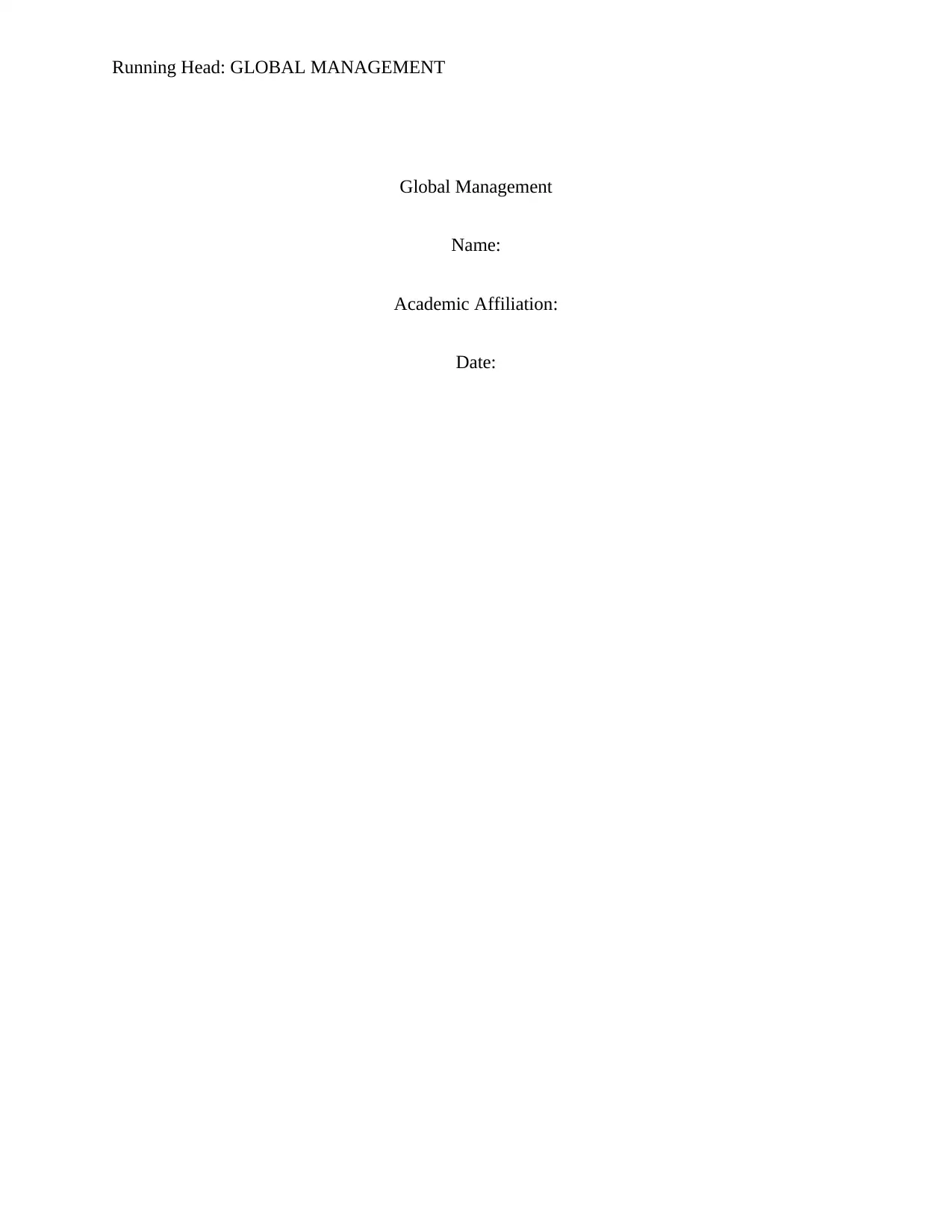
Running Head: GLOBAL MANAGEMENT
Global Management
Name:
Academic Affiliation:
Date:
Global Management
Name:
Academic Affiliation:
Date:
Paraphrase This Document
Need a fresh take? Get an instant paraphrase of this document with our AI Paraphraser
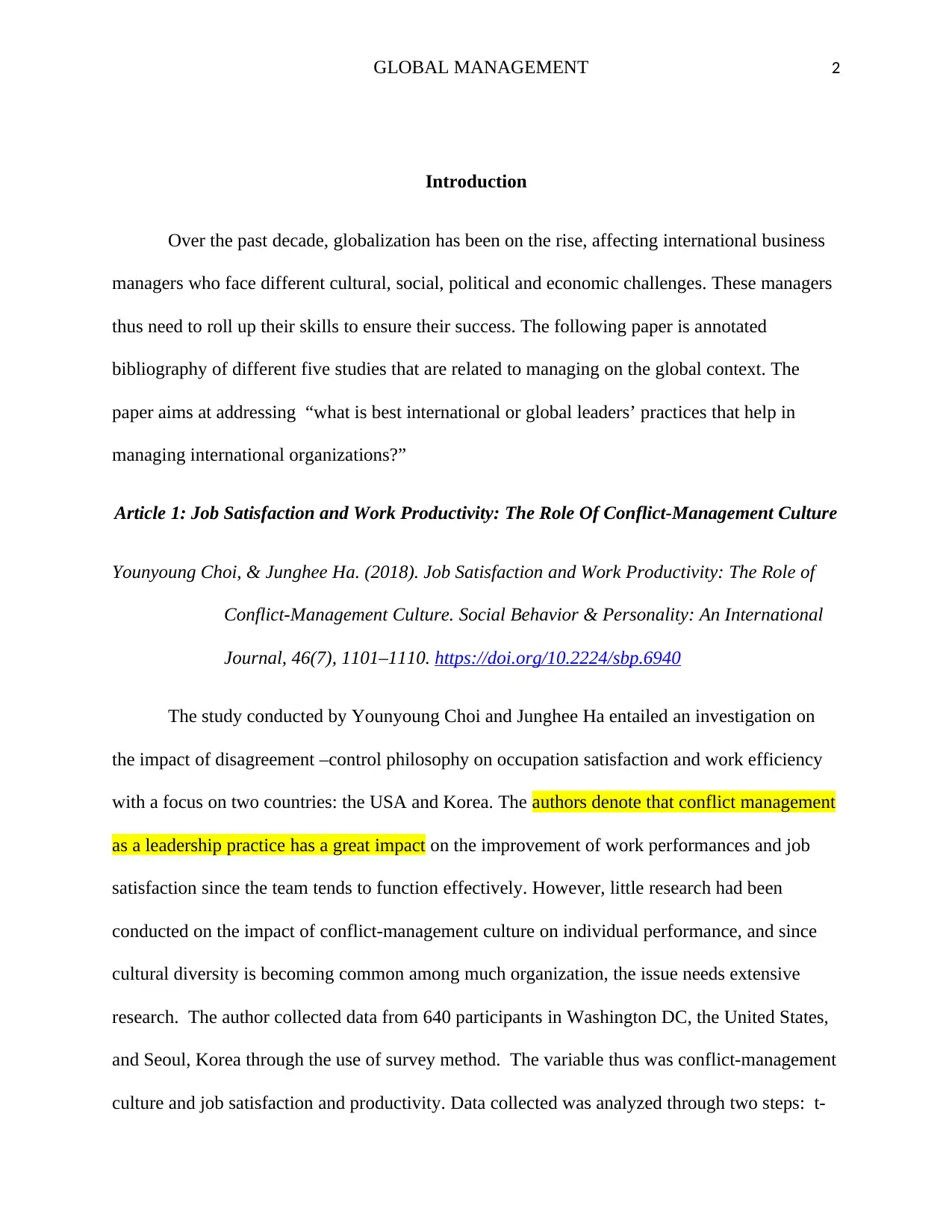
GLOBAL MANAGEMENT 2
Introduction
Over the past decade, globalization has been on the rise, affecting international business
managers who face different cultural, social, political and economic challenges. These managers
thus need to roll up their skills to ensure their success. The following paper is annotated
bibliography of different five studies that are related to managing on the global context. The
paper aims at addressing “what is best international or global leaders’ practices that help in
managing international organizations?”
Article 1: Job Satisfaction and Work Productivity: The Role Of Conflict-Management Culture
Younyoung Choi, & Junghee Ha. (2018). Job Satisfaction and Work Productivity: The Role of
Conflict-Management Culture. Social Behavior & Personality: An International
Journal, 46(7), 1101–1110. https://doi.org/10.2224/sbp.6940
The study conducted by Younyoung Choi and Junghee Ha entailed an investigation on
the impact of disagreement –control philosophy on occupation satisfaction and work efficiency
with a focus on two countries: the USA and Korea. The authors denote that conflict management
as a leadership practice has a great impact on the improvement of work performances and job
satisfaction since the team tends to function effectively. However, little research had been
conducted on the impact of conflict-management culture on individual performance, and since
cultural diversity is becoming common among much organization, the issue needs extensive
research. The author collected data from 640 participants in Washington DC, the United States,
and Seoul, Korea through the use of survey method. The variable thus was conflict-management
culture and job satisfaction and productivity. Data collected was analyzed through two steps: t-
Introduction
Over the past decade, globalization has been on the rise, affecting international business
managers who face different cultural, social, political and economic challenges. These managers
thus need to roll up their skills to ensure their success. The following paper is annotated
bibliography of different five studies that are related to managing on the global context. The
paper aims at addressing “what is best international or global leaders’ practices that help in
managing international organizations?”
Article 1: Job Satisfaction and Work Productivity: The Role Of Conflict-Management Culture
Younyoung Choi, & Junghee Ha. (2018). Job Satisfaction and Work Productivity: The Role of
Conflict-Management Culture. Social Behavior & Personality: An International
Journal, 46(7), 1101–1110. https://doi.org/10.2224/sbp.6940
The study conducted by Younyoung Choi and Junghee Ha entailed an investigation on
the impact of disagreement –control philosophy on occupation satisfaction and work efficiency
with a focus on two countries: the USA and Korea. The authors denote that conflict management
as a leadership practice has a great impact on the improvement of work performances and job
satisfaction since the team tends to function effectively. However, little research had been
conducted on the impact of conflict-management culture on individual performance, and since
cultural diversity is becoming common among much organization, the issue needs extensive
research. The author collected data from 640 participants in Washington DC, the United States,
and Seoul, Korea through the use of survey method. The variable thus was conflict-management
culture and job satisfaction and productivity. Data collected was analyzed through two steps: t-
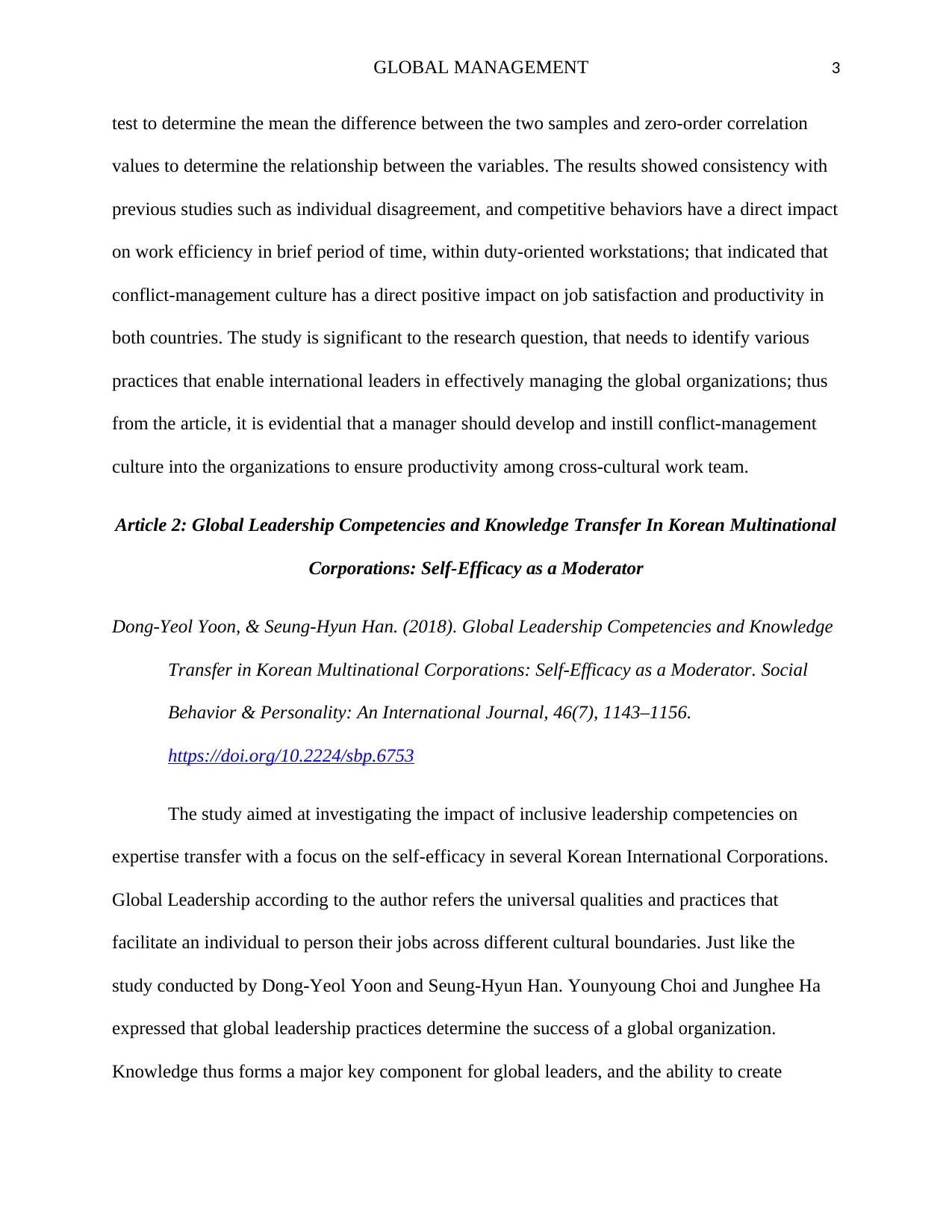
GLOBAL MANAGEMENT 3
test to determine the mean the difference between the two samples and zero-order correlation
values to determine the relationship between the variables. The results showed consistency with
previous studies such as individual disagreement, and competitive behaviors have a direct impact
on work efficiency in brief period of time, within duty-oriented workstations; that indicated that
conflict-management culture has a direct positive impact on job satisfaction and productivity in
both countries. The study is significant to the research question, that needs to identify various
practices that enable international leaders in effectively managing the global organizations; thus
from the article, it is evidential that a manager should develop and instill conflict-management
culture into the organizations to ensure productivity among cross-cultural work team.
Article 2: Global Leadership Competencies and Knowledge Transfer In Korean Multinational
Corporations: Self-Efficacy as a Moderator
Dong-Yeol Yoon, & Seung-Hyun Han. (2018). Global Leadership Competencies and Knowledge
Transfer in Korean Multinational Corporations: Self-Efficacy as a Moderator. Social
Behavior & Personality: An International Journal, 46(7), 1143–1156.
https://doi.org/10.2224/sbp.6753
The study aimed at investigating the impact of inclusive leadership competencies on
expertise transfer with a focus on the self-efficacy in several Korean International Corporations.
Global Leadership according to the author refers the universal qualities and practices that
facilitate an individual to person their jobs across different cultural boundaries. Just like the
study conducted by Dong-Yeol Yoon and Seung-Hyun Han. Younyoung Choi and Junghee Ha
expressed that global leadership practices determine the success of a global organization.
Knowledge thus forms a major key component for global leaders, and the ability to create
test to determine the mean the difference between the two samples and zero-order correlation
values to determine the relationship between the variables. The results showed consistency with
previous studies such as individual disagreement, and competitive behaviors have a direct impact
on work efficiency in brief period of time, within duty-oriented workstations; that indicated that
conflict-management culture has a direct positive impact on job satisfaction and productivity in
both countries. The study is significant to the research question, that needs to identify various
practices that enable international leaders in effectively managing the global organizations; thus
from the article, it is evidential that a manager should develop and instill conflict-management
culture into the organizations to ensure productivity among cross-cultural work team.
Article 2: Global Leadership Competencies and Knowledge Transfer In Korean Multinational
Corporations: Self-Efficacy as a Moderator
Dong-Yeol Yoon, & Seung-Hyun Han. (2018). Global Leadership Competencies and Knowledge
Transfer in Korean Multinational Corporations: Self-Efficacy as a Moderator. Social
Behavior & Personality: An International Journal, 46(7), 1143–1156.
https://doi.org/10.2224/sbp.6753
The study aimed at investigating the impact of inclusive leadership competencies on
expertise transfer with a focus on the self-efficacy in several Korean International Corporations.
Global Leadership according to the author refers the universal qualities and practices that
facilitate an individual to person their jobs across different cultural boundaries. Just like the
study conducted by Dong-Yeol Yoon and Seung-Hyun Han. Younyoung Choi and Junghee Ha
expressed that global leadership practices determine the success of a global organization.
Knowledge thus forms a major key component for global leaders, and the ability to create
⊘ This is a preview!⊘
Do you want full access?
Subscribe today to unlock all pages.

Trusted by 1+ million students worldwide
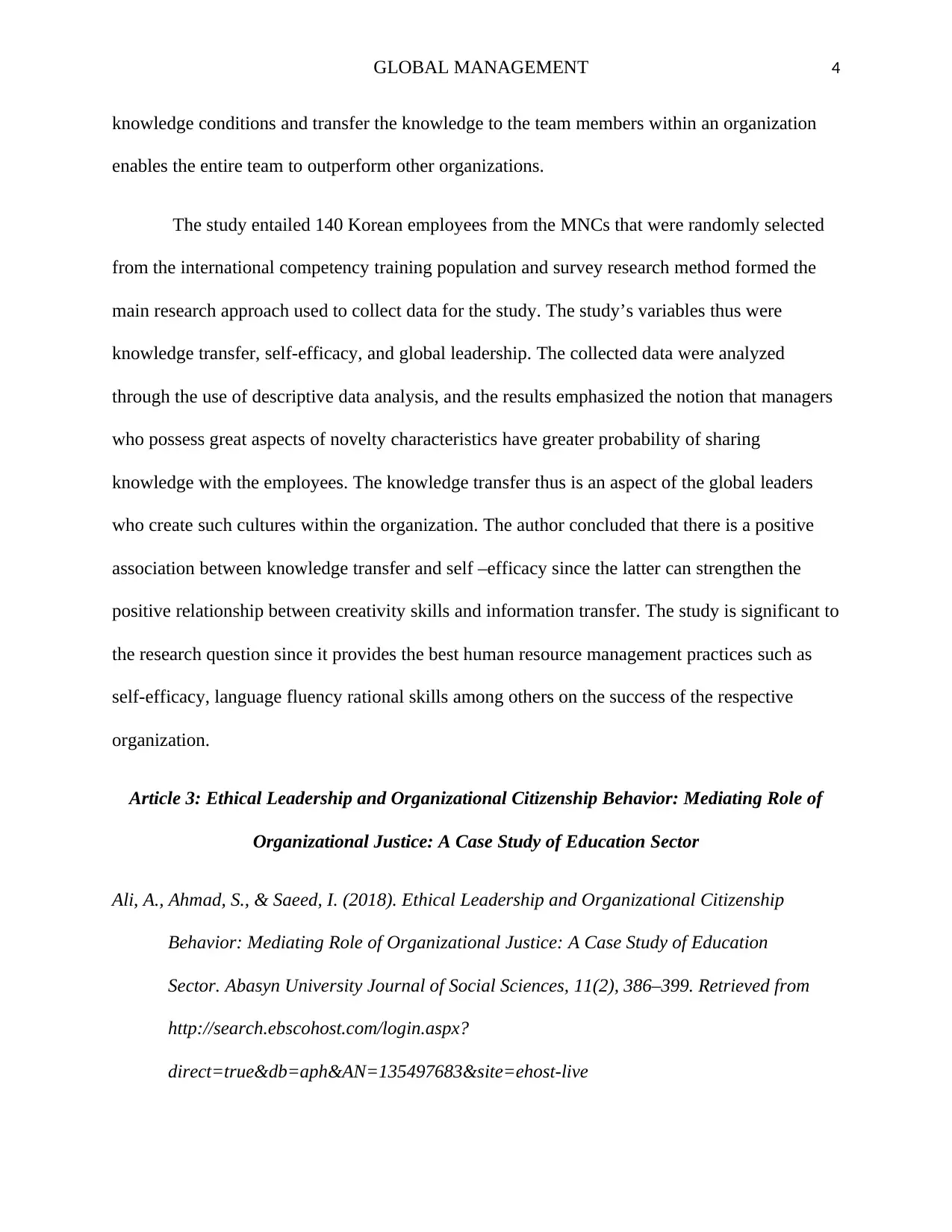
GLOBAL MANAGEMENT 4
knowledge conditions and transfer the knowledge to the team members within an organization
enables the entire team to outperform other organizations.
The study entailed 140 Korean employees from the MNCs that were randomly selected
from the international competency training population and survey research method formed the
main research approach used to collect data for the study. The study’s variables thus were
knowledge transfer, self-efficacy, and global leadership. The collected data were analyzed
through the use of descriptive data analysis, and the results emphasized the notion that managers
who possess great aspects of novelty characteristics have greater probability of sharing
knowledge with the employees. The knowledge transfer thus is an aspect of the global leaders
who create such cultures within the organization. The author concluded that there is a positive
association between knowledge transfer and self –efficacy since the latter can strengthen the
positive relationship between creativity skills and information transfer. The study is significant to
the research question since it provides the best human resource management practices such as
self-efficacy, language fluency rational skills among others on the success of the respective
organization.
Article 3: Ethical Leadership and Organizational Citizenship Behavior: Mediating Role of
Organizational Justice: A Case Study of Education Sector
Ali, A., Ahmad, S., & Saeed, I. (2018). Ethical Leadership and Organizational Citizenship
Behavior: Mediating Role of Organizational Justice: A Case Study of Education
Sector. Abasyn University Journal of Social Sciences, 11(2), 386–399. Retrieved from
http://search.ebscohost.com/login.aspx?
direct=true&db=aph&AN=135497683&site=ehost-live
knowledge conditions and transfer the knowledge to the team members within an organization
enables the entire team to outperform other organizations.
The study entailed 140 Korean employees from the MNCs that were randomly selected
from the international competency training population and survey research method formed the
main research approach used to collect data for the study. The study’s variables thus were
knowledge transfer, self-efficacy, and global leadership. The collected data were analyzed
through the use of descriptive data analysis, and the results emphasized the notion that managers
who possess great aspects of novelty characteristics have greater probability of sharing
knowledge with the employees. The knowledge transfer thus is an aspect of the global leaders
who create such cultures within the organization. The author concluded that there is a positive
association between knowledge transfer and self –efficacy since the latter can strengthen the
positive relationship between creativity skills and information transfer. The study is significant to
the research question since it provides the best human resource management practices such as
self-efficacy, language fluency rational skills among others on the success of the respective
organization.
Article 3: Ethical Leadership and Organizational Citizenship Behavior: Mediating Role of
Organizational Justice: A Case Study of Education Sector
Ali, A., Ahmad, S., & Saeed, I. (2018). Ethical Leadership and Organizational Citizenship
Behavior: Mediating Role of Organizational Justice: A Case Study of Education
Sector. Abasyn University Journal of Social Sciences, 11(2), 386–399. Retrieved from
http://search.ebscohost.com/login.aspx?
direct=true&db=aph&AN=135497683&site=ehost-live
Paraphrase This Document
Need a fresh take? Get an instant paraphrase of this document with our AI Paraphraser
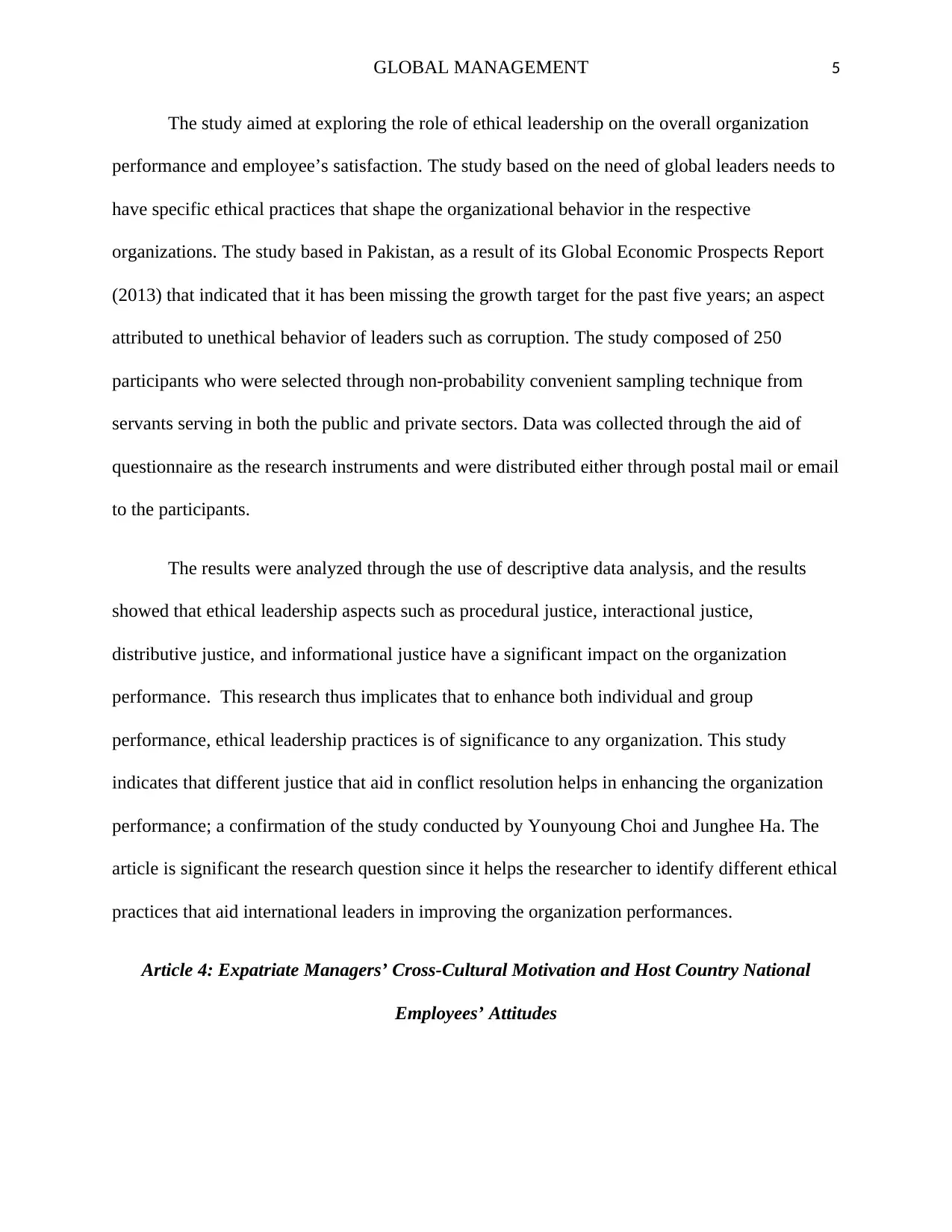
GLOBAL MANAGEMENT 5
The study aimed at exploring the role of ethical leadership on the overall organization
performance and employee’s satisfaction. The study based on the need of global leaders needs to
have specific ethical practices that shape the organizational behavior in the respective
organizations. The study based in Pakistan, as a result of its Global Economic Prospects Report
(2013) that indicated that it has been missing the growth target for the past five years; an aspect
attributed to unethical behavior of leaders such as corruption. The study composed of 250
participants who were selected through non-probability convenient sampling technique from
servants serving in both the public and private sectors. Data was collected through the aid of
questionnaire as the research instruments and were distributed either through postal mail or email
to the participants.
The results were analyzed through the use of descriptive data analysis, and the results
showed that ethical leadership aspects such as procedural justice, interactional justice,
distributive justice, and informational justice have a significant impact on the organization
performance. This research thus implicates that to enhance both individual and group
performance, ethical leadership practices is of significance to any organization. This study
indicates that different justice that aid in conflict resolution helps in enhancing the organization
performance; a confirmation of the study conducted by Younyoung Choi and Junghee Ha. The
article is significant the research question since it helps the researcher to identify different ethical
practices that aid international leaders in improving the organization performances.
Article 4: Expatriate Managers’ Cross-Cultural Motivation and Host Country National
Employees’ Attitudes
The study aimed at exploring the role of ethical leadership on the overall organization
performance and employee’s satisfaction. The study based on the need of global leaders needs to
have specific ethical practices that shape the organizational behavior in the respective
organizations. The study based in Pakistan, as a result of its Global Economic Prospects Report
(2013) that indicated that it has been missing the growth target for the past five years; an aspect
attributed to unethical behavior of leaders such as corruption. The study composed of 250
participants who were selected through non-probability convenient sampling technique from
servants serving in both the public and private sectors. Data was collected through the aid of
questionnaire as the research instruments and were distributed either through postal mail or email
to the participants.
The results were analyzed through the use of descriptive data analysis, and the results
showed that ethical leadership aspects such as procedural justice, interactional justice,
distributive justice, and informational justice have a significant impact on the organization
performance. This research thus implicates that to enhance both individual and group
performance, ethical leadership practices is of significance to any organization. This study
indicates that different justice that aid in conflict resolution helps in enhancing the organization
performance; a confirmation of the study conducted by Younyoung Choi and Junghee Ha. The
article is significant the research question since it helps the researcher to identify different ethical
practices that aid international leaders in improving the organization performances.
Article 4: Expatriate Managers’ Cross-Cultural Motivation and Host Country National
Employees’ Attitudes
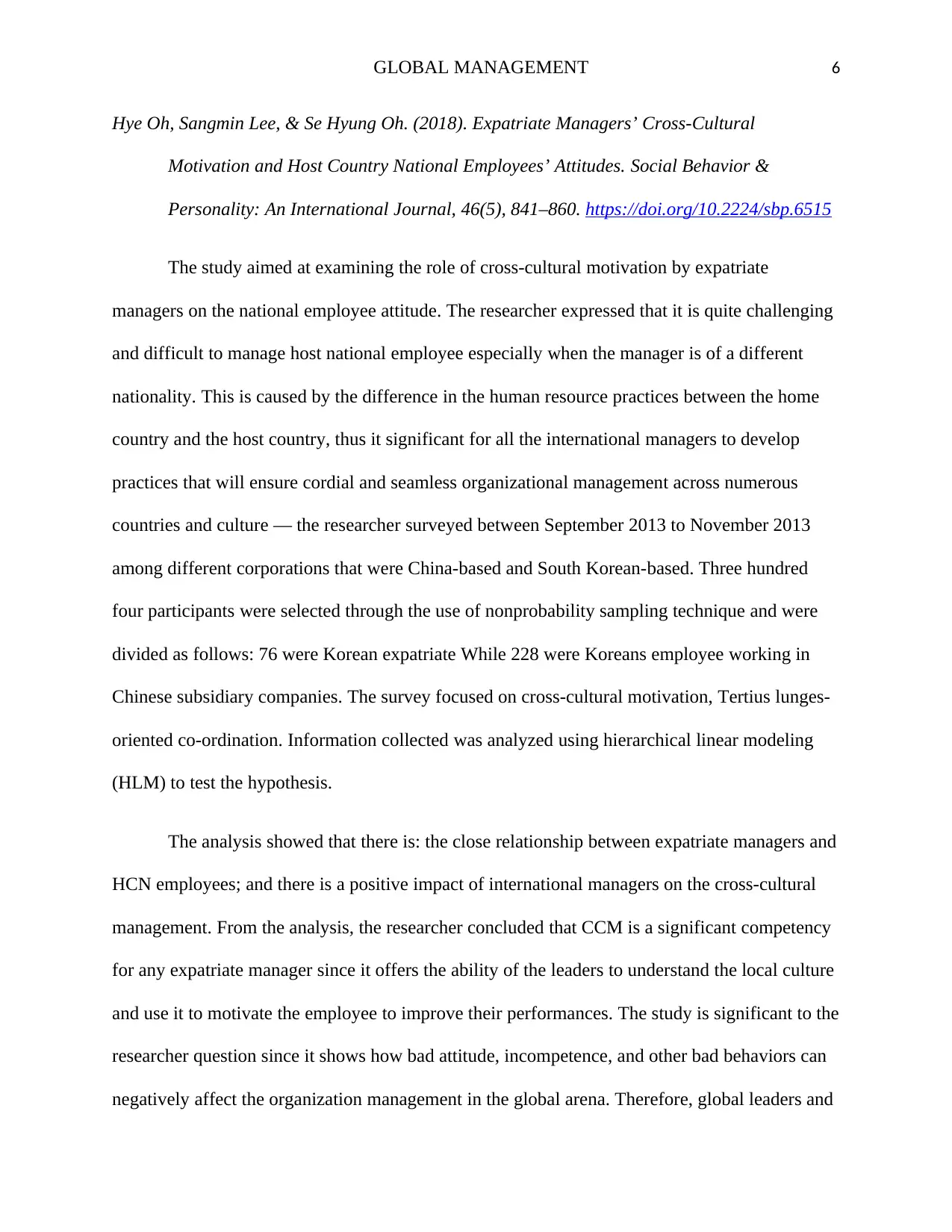
GLOBAL MANAGEMENT 6
Hye Oh, Sangmin Lee, & Se Hyung Oh. (2018). Expatriate Managers’ Cross-Cultural
Motivation and Host Country National Employees’ Attitudes. Social Behavior &
Personality: An International Journal, 46(5), 841–860. https://doi.org/10.2224/sbp.6515
The study aimed at examining the role of cross-cultural motivation by expatriate
managers on the national employee attitude. The researcher expressed that it is quite challenging
and difficult to manage host national employee especially when the manager is of a different
nationality. This is caused by the difference in the human resource practices between the home
country and the host country, thus it significant for all the international managers to develop
practices that will ensure cordial and seamless organizational management across numerous
countries and culture — the researcher surveyed between September 2013 to November 2013
among different corporations that were China-based and South Korean-based. Three hundred
four participants were selected through the use of nonprobability sampling technique and were
divided as follows: 76 were Korean expatriate While 228 were Koreans employee working in
Chinese subsidiary companies. The survey focused on cross-cultural motivation, Tertius lunges-
oriented co-ordination. Information collected was analyzed using hierarchical linear modeling
(HLM) to test the hypothesis.
The analysis showed that there is: the close relationship between expatriate managers and
HCN employees; and there is a positive impact of international managers on the cross-cultural
management. From the analysis, the researcher concluded that CCM is a significant competency
for any expatriate manager since it offers the ability of the leaders to understand the local culture
and use it to motivate the employee to improve their performances. The study is significant to the
researcher question since it shows how bad attitude, incompetence, and other bad behaviors can
negatively affect the organization management in the global arena. Therefore, global leaders and
Hye Oh, Sangmin Lee, & Se Hyung Oh. (2018). Expatriate Managers’ Cross-Cultural
Motivation and Host Country National Employees’ Attitudes. Social Behavior &
Personality: An International Journal, 46(5), 841–860. https://doi.org/10.2224/sbp.6515
The study aimed at examining the role of cross-cultural motivation by expatriate
managers on the national employee attitude. The researcher expressed that it is quite challenging
and difficult to manage host national employee especially when the manager is of a different
nationality. This is caused by the difference in the human resource practices between the home
country and the host country, thus it significant for all the international managers to develop
practices that will ensure cordial and seamless organizational management across numerous
countries and culture — the researcher surveyed between September 2013 to November 2013
among different corporations that were China-based and South Korean-based. Three hundred
four participants were selected through the use of nonprobability sampling technique and were
divided as follows: 76 were Korean expatriate While 228 were Koreans employee working in
Chinese subsidiary companies. The survey focused on cross-cultural motivation, Tertius lunges-
oriented co-ordination. Information collected was analyzed using hierarchical linear modeling
(HLM) to test the hypothesis.
The analysis showed that there is: the close relationship between expatriate managers and
HCN employees; and there is a positive impact of international managers on the cross-cultural
management. From the analysis, the researcher concluded that CCM is a significant competency
for any expatriate manager since it offers the ability of the leaders to understand the local culture
and use it to motivate the employee to improve their performances. The study is significant to the
researcher question since it shows how bad attitude, incompetence, and other bad behaviors can
negatively affect the organization management in the global arena. Therefore, global leaders and
⊘ This is a preview!⊘
Do you want full access?
Subscribe today to unlock all pages.

Trusted by 1+ million students worldwide
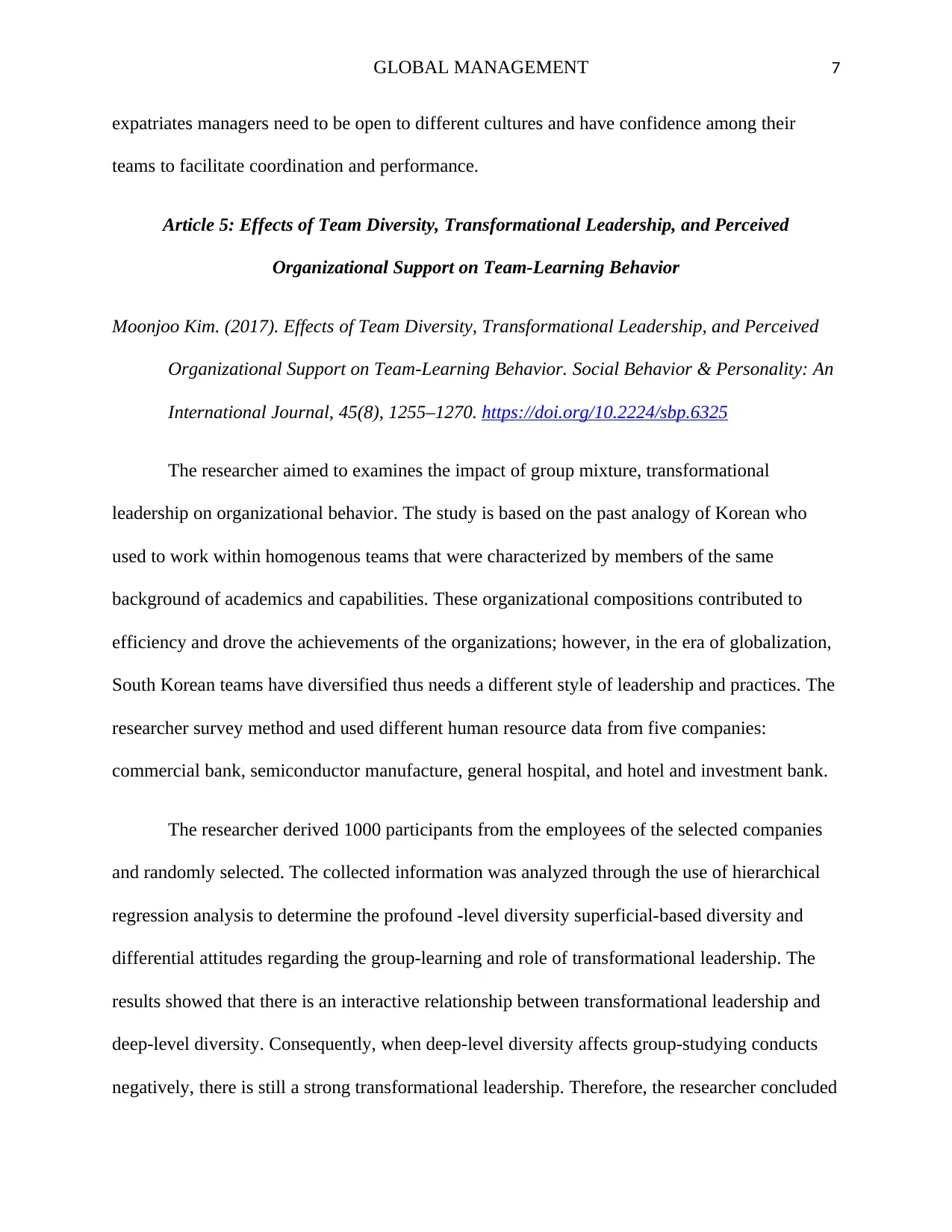
GLOBAL MANAGEMENT 7
expatriates managers need to be open to different cultures and have confidence among their
teams to facilitate coordination and performance.
Article 5: Effects of Team Diversity, Transformational Leadership, and Perceived
Organizational Support on Team-Learning Behavior
Moonjoo Kim. (2017). Effects of Team Diversity, Transformational Leadership, and Perceived
Organizational Support on Team-Learning Behavior. Social Behavior & Personality: An
International Journal, 45(8), 1255–1270. https://doi.org/10.2224/sbp.6325
The researcher aimed to examines the impact of group mixture, transformational
leadership on organizational behavior. The study is based on the past analogy of Korean who
used to work within homogenous teams that were characterized by members of the same
background of academics and capabilities. These organizational compositions contributed to
efficiency and drove the achievements of the organizations; however, in the era of globalization,
South Korean teams have diversified thus needs a different style of leadership and practices. The
researcher survey method and used different human resource data from five companies:
commercial bank, semiconductor manufacture, general hospital, and hotel and investment bank.
The researcher derived 1000 participants from the employees of the selected companies
and randomly selected. The collected information was analyzed through the use of hierarchical
regression analysis to determine the profound -level diversity superficial-based diversity and
differential attitudes regarding the group-learning and role of transformational leadership. The
results showed that there is an interactive relationship between transformational leadership and
deep-level diversity. Consequently, when deep-level diversity affects group-studying conducts
negatively, there is still a strong transformational leadership. Therefore, the researcher concluded
expatriates managers need to be open to different cultures and have confidence among their
teams to facilitate coordination and performance.
Article 5: Effects of Team Diversity, Transformational Leadership, and Perceived
Organizational Support on Team-Learning Behavior
Moonjoo Kim. (2017). Effects of Team Diversity, Transformational Leadership, and Perceived
Organizational Support on Team-Learning Behavior. Social Behavior & Personality: An
International Journal, 45(8), 1255–1270. https://doi.org/10.2224/sbp.6325
The researcher aimed to examines the impact of group mixture, transformational
leadership on organizational behavior. The study is based on the past analogy of Korean who
used to work within homogenous teams that were characterized by members of the same
background of academics and capabilities. These organizational compositions contributed to
efficiency and drove the achievements of the organizations; however, in the era of globalization,
South Korean teams have diversified thus needs a different style of leadership and practices. The
researcher survey method and used different human resource data from five companies:
commercial bank, semiconductor manufacture, general hospital, and hotel and investment bank.
The researcher derived 1000 participants from the employees of the selected companies
and randomly selected. The collected information was analyzed through the use of hierarchical
regression analysis to determine the profound -level diversity superficial-based diversity and
differential attitudes regarding the group-learning and role of transformational leadership. The
results showed that there is an interactive relationship between transformational leadership and
deep-level diversity. Consequently, when deep-level diversity affects group-studying conducts
negatively, there is still a strong transformational leadership. Therefore, the researcher concluded
Paraphrase This Document
Need a fresh take? Get an instant paraphrase of this document with our AI Paraphraser
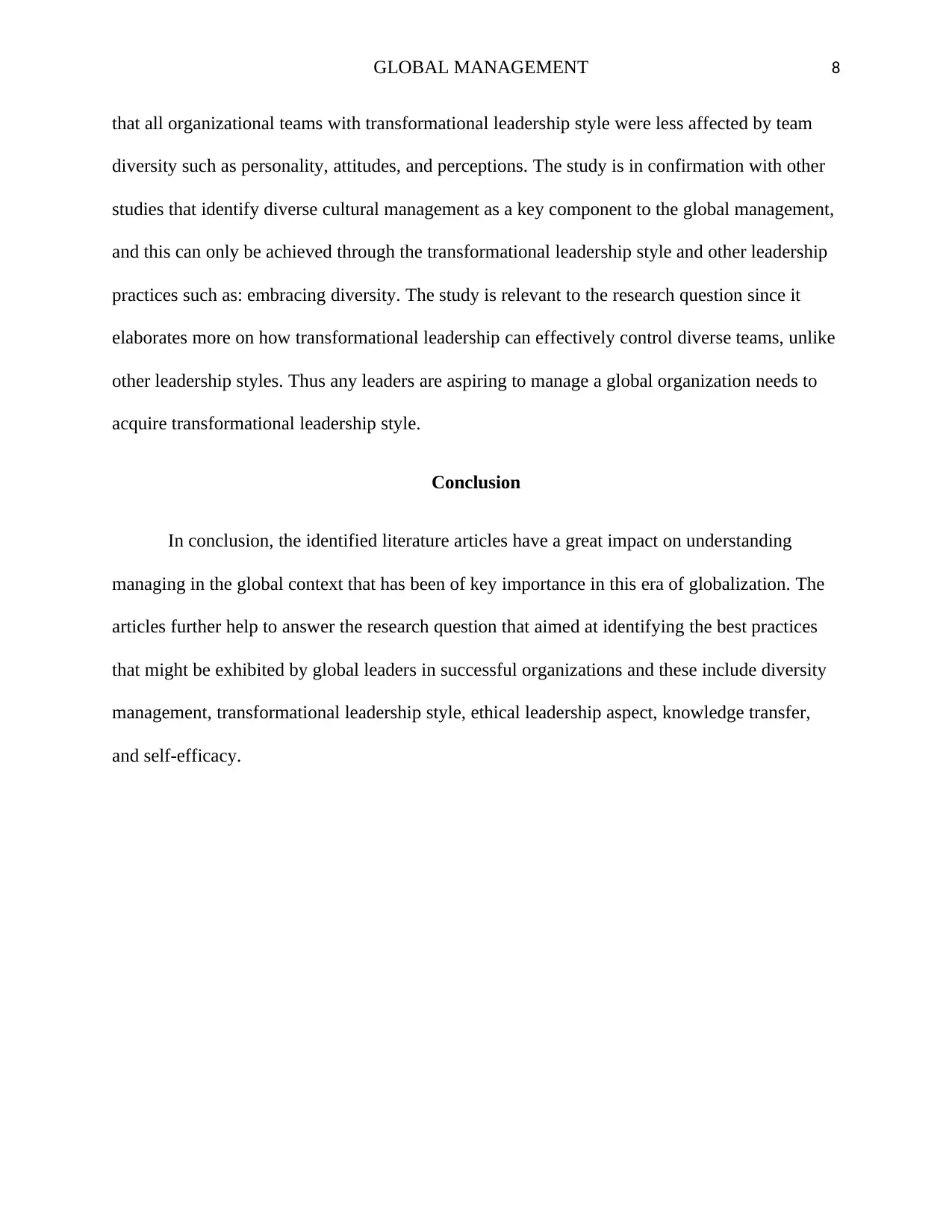
GLOBAL MANAGEMENT 8
that all organizational teams with transformational leadership style were less affected by team
diversity such as personality, attitudes, and perceptions. The study is in confirmation with other
studies that identify diverse cultural management as a key component to the global management,
and this can only be achieved through the transformational leadership style and other leadership
practices such as: embracing diversity. The study is relevant to the research question since it
elaborates more on how transformational leadership can effectively control diverse teams, unlike
other leadership styles. Thus any leaders are aspiring to manage a global organization needs to
acquire transformational leadership style.
Conclusion
In conclusion, the identified literature articles have a great impact on understanding
managing in the global context that has been of key importance in this era of globalization. The
articles further help to answer the research question that aimed at identifying the best practices
that might be exhibited by global leaders in successful organizations and these include diversity
management, transformational leadership style, ethical leadership aspect, knowledge transfer,
and self-efficacy.
that all organizational teams with transformational leadership style were less affected by team
diversity such as personality, attitudes, and perceptions. The study is in confirmation with other
studies that identify diverse cultural management as a key component to the global management,
and this can only be achieved through the transformational leadership style and other leadership
practices such as: embracing diversity. The study is relevant to the research question since it
elaborates more on how transformational leadership can effectively control diverse teams, unlike
other leadership styles. Thus any leaders are aspiring to manage a global organization needs to
acquire transformational leadership style.
Conclusion
In conclusion, the identified literature articles have a great impact on understanding
managing in the global context that has been of key importance in this era of globalization. The
articles further help to answer the research question that aimed at identifying the best practices
that might be exhibited by global leaders in successful organizations and these include diversity
management, transformational leadership style, ethical leadership aspect, knowledge transfer,
and self-efficacy.
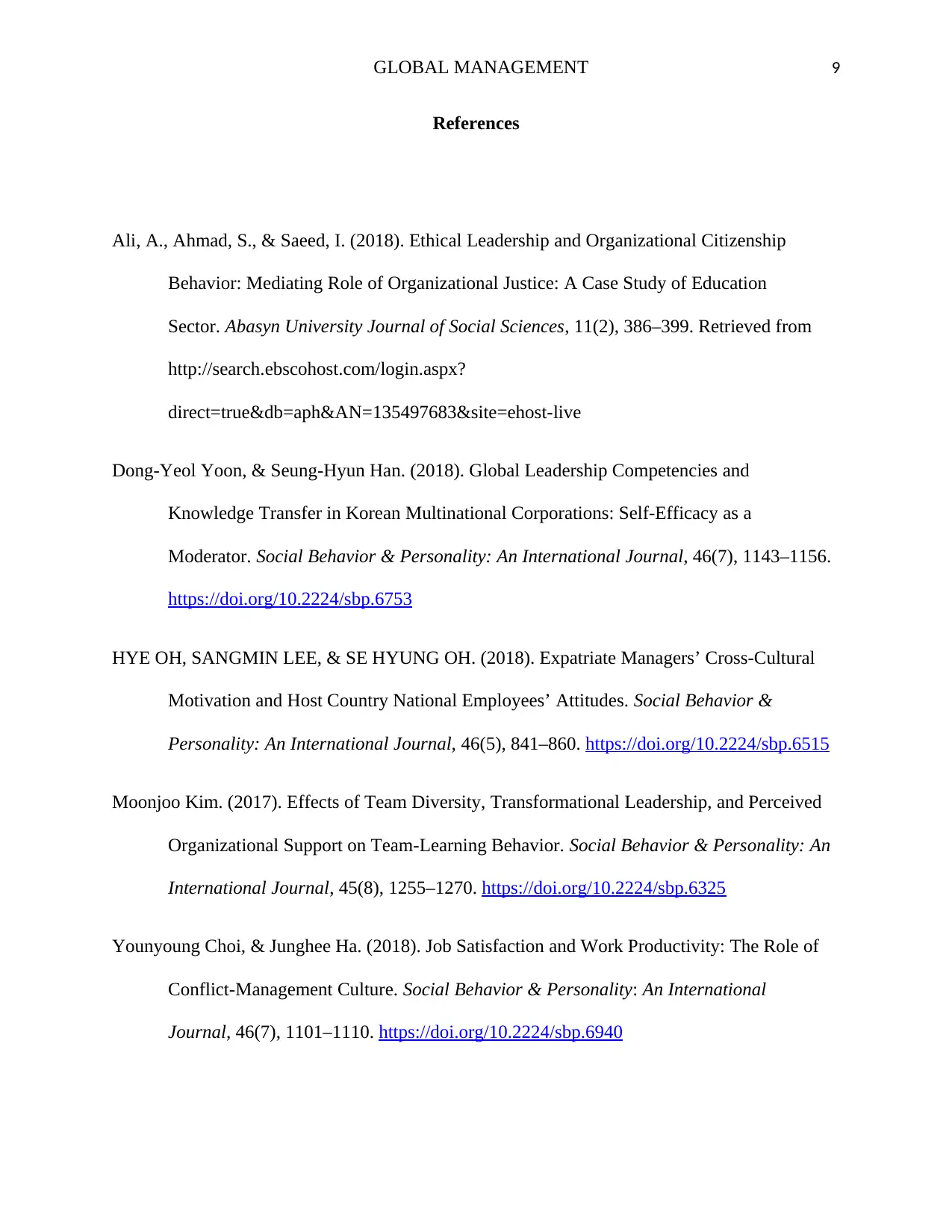
GLOBAL MANAGEMENT 9
References
Ali, A., Ahmad, S., & Saeed, I. (2018). Ethical Leadership and Organizational Citizenship
Behavior: Mediating Role of Organizational Justice: A Case Study of Education
Sector. Abasyn University Journal of Social Sciences, 11(2), 386–399. Retrieved from
http://search.ebscohost.com/login.aspx?
direct=true&db=aph&AN=135497683&site=ehost-live
Dong-Yeol Yoon, & Seung-Hyun Han. (2018). Global Leadership Competencies and
Knowledge Transfer in Korean Multinational Corporations: Self-Efficacy as a
Moderator. Social Behavior & Personality: An International Journal, 46(7), 1143–1156.
https://doi.org/10.2224/sbp.6753
HYE OH, SANGMIN LEE, & SE HYUNG OH. (2018). Expatriate Managers’ Cross-Cultural
Motivation and Host Country National Employees’ Attitudes. Social Behavior &
Personality: An International Journal, 46(5), 841–860. https://doi.org/10.2224/sbp.6515
Moonjoo Kim. (2017). Effects of Team Diversity, Transformational Leadership, and Perceived
Organizational Support on Team-Learning Behavior. Social Behavior & Personality: An
International Journal, 45(8), 1255–1270. https://doi.org/10.2224/sbp.6325
Younyoung Choi, & Junghee Ha. (2018). Job Satisfaction and Work Productivity: The Role of
Conflict-Management Culture. Social Behavior & Personality: An International
Journal, 46(7), 1101–1110. https://doi.org/10.2224/sbp.6940
References
Ali, A., Ahmad, S., & Saeed, I. (2018). Ethical Leadership and Organizational Citizenship
Behavior: Mediating Role of Organizational Justice: A Case Study of Education
Sector. Abasyn University Journal of Social Sciences, 11(2), 386–399. Retrieved from
http://search.ebscohost.com/login.aspx?
direct=true&db=aph&AN=135497683&site=ehost-live
Dong-Yeol Yoon, & Seung-Hyun Han. (2018). Global Leadership Competencies and
Knowledge Transfer in Korean Multinational Corporations: Self-Efficacy as a
Moderator. Social Behavior & Personality: An International Journal, 46(7), 1143–1156.
https://doi.org/10.2224/sbp.6753
HYE OH, SANGMIN LEE, & SE HYUNG OH. (2018). Expatriate Managers’ Cross-Cultural
Motivation and Host Country National Employees’ Attitudes. Social Behavior &
Personality: An International Journal, 46(5), 841–860. https://doi.org/10.2224/sbp.6515
Moonjoo Kim. (2017). Effects of Team Diversity, Transformational Leadership, and Perceived
Organizational Support on Team-Learning Behavior. Social Behavior & Personality: An
International Journal, 45(8), 1255–1270. https://doi.org/10.2224/sbp.6325
Younyoung Choi, & Junghee Ha. (2018). Job Satisfaction and Work Productivity: The Role of
Conflict-Management Culture. Social Behavior & Personality: An International
Journal, 46(7), 1101–1110. https://doi.org/10.2224/sbp.6940
⊘ This is a preview!⊘
Do you want full access?
Subscribe today to unlock all pages.

Trusted by 1+ million students worldwide
1 out of 9
Your All-in-One AI-Powered Toolkit for Academic Success.
+13062052269
info@desklib.com
Available 24*7 on WhatsApp / Email
![[object Object]](/_next/static/media/star-bottom.7253800d.svg)
Unlock your academic potential
Copyright © 2020–2025 A2Z Services. All Rights Reserved. Developed and managed by ZUCOL.
